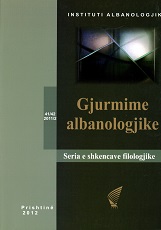REXHEP QOSJA: POSTMODERNIZËM NË LETËRSINË SHQIPTARE
REXHEP QOSJA: POSTMODERNISM IN ALBANIAN LITERATURE
Author(s): Dado FloreshaSubject(s): Literary Texts
Published by: Instituti Albanologjik i Prishtinës
Keywords: REXHEP QOSJA ; POSTMODERNISM ; ALBANIAN LITERATURE
Summary/Abstract: As any literary term, which would be introduced in Albanian literature with delay, also Postmodernism appears, however, reluctantly among Kosovan authors during the eighties, whilst in Albania only after nineties. If only because of this single fact (when historiccultural situations are very different), Postmodernism in present time Albanian literature has its own specifics. By three novels, “Vdekja më vjen prej syve të tillë”/”Death comes to me from such eyes”, “Një dashuri dhe shtatë faje”/”One love and seven sins” and “Nata është dita jonë”/”Night is our day”, in which are separated, gathered, harmonized, and dissolved modernist and postmodernist features, Rexhep Qosja could be considered as one of most consolidated representatives of Albanian postmodernist literature. Within internal enigmas of Postmodernism and its disputable relations with Modernism, when Albanian literature is in question this problematic appears even more complicated. Postmodernist phenomenon occurs in an original conception in the novels of Rexhep Qosja. The last novel “Nata është dita jonë” with essential features of its poetics, in one aspect satisfies macrostructure of his prose, where the limits between modernism and postmodernism are not easily distinguished. At the other side, the novel appears a microstructure, where Qosjan postmodernism is as much stable as in the process of movement. The novel “Nata është dita jonë” consolidates Rexhep Qosja’s postmodern creative imagination. His individuality occurs both in deepening of postmodern features, characteristic for this literary term in European and Anglo-American literature, and in originality, in peculiarities of principles and original techniques in building internal and external structure of the work. I think that Rexhep Qosja promoted by each new work as a most consolidated representative of Albanian postmodernism, proving that present day literature, even though late, is trying successfully new explorations in its esthetical principles.
Journal: Gjurmime Albanologjike - Seria e shkencave filologjike
- Issue Year: 2011
- Issue No: 41-42
- Page Range: 299-310
- Page Count: 12
- Language: Albanian
- Content File-PDF

